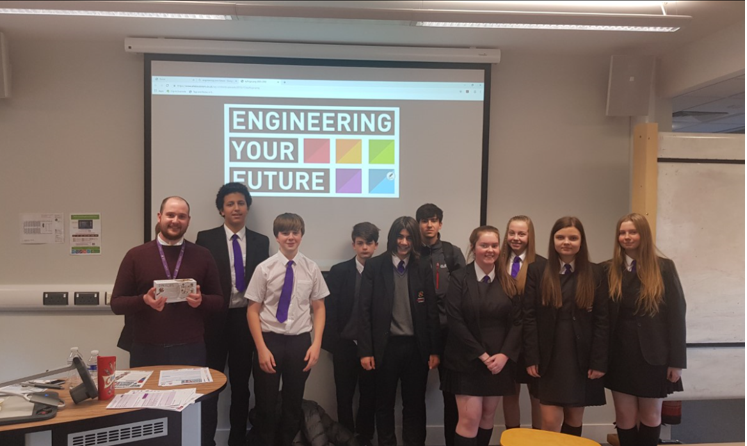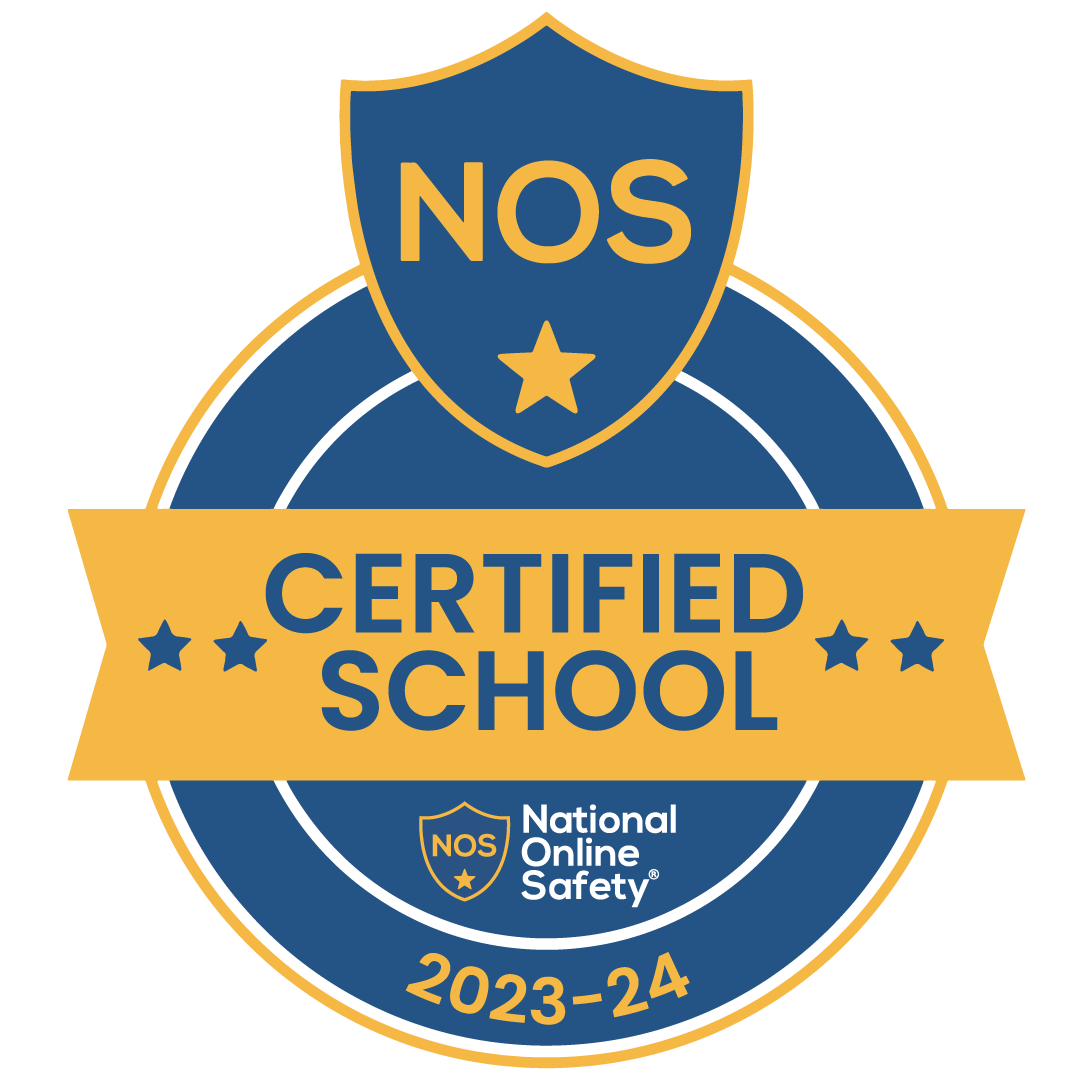Science
Department Staffing & Roles
- Leader of Science: Mr T Finnigan
- 2nd in Science: Mrs M Cookson
- Leader of Biology: Miss J Sinclair
Science Staff
- Mrs L O’Rourke – Classroom teacher of Science / Assistant Principal – Attendance
- Miss V Fearns – Classroom Teacher of Science / Assistant Principal – Quality of Education
- Miss K Owen – Classroom Teacher of Science / Assistant Head of Year 7
- Mrs H Pope – Classroom Teacher of Science / Head of Year 7
- Mrs M Cookson – Classroom Teacher of Science/2nd in Science/Leader of Initial Teacher Training
- Mr R Laughton – Classroom Teacher Science
- Mr T Finnigan – Classroom Teacher of Science/Leader of Science
- Mrs L Flynn – Classroom Teacher of Science/ Head of Year 10
- Miss J Sinclair – Classroom Teacher of Science/Leader of Biology
- Mr M Devonald – Classroom Teacher of Science
- Science Technician: Mrs J Jones
KS3 Intent
To provide a broad curriculum at KS3 that encompasses the National Curriculum. Ensuring all our students have the opportunity to learn a breadth of science to prepare them for choices they might make in the future with regard to their education. Inspiring our students to have an interest in science and an understanding of how vast the subject is and how important the content they learn is for them as an individual. To develop their working scientifically skills along with igniting engagement through the study of new scientific discoveries and developments.
KS4 Intent
The intent of our KS4 curriculum is for students to begin the GCSE science course, to broaden their knowledge and build on prior knowledge from KS3. We offer both separate science course and trilogy science course. Providing opportunity to all our students and equipping them with the knowledge required for future study. A curriculum that allows for visits to local Universities and Colleges to support students with their ideas for their next steps in their education.
Delivering a curriculum that involves a wide range of key scientific theories and discoveries promoting cultural capital. Activities that encourage character building and promote independence and resilience. Equipping students with the necessary knowledge and support to achieve outstanding GCSE results along with the option for further study in a science discipline.
The aims of the department are to help students:
- develop a passion for, and a curiosity about the living world
- develop an understanding of how science works
- develop their observational, numerical and investigative abilities
We aim to create a teaching environment within which the student is encouraged to contribute his or her own views and experiences in order to develop their practical and theoretical understanding of science in the wider context.
The development of practical skills is an essential part of the science course, and teaching encourages investigation and experimentation.
“The important thing is never to stop questioning.” Albert Einstein
KS3 Curriculum -Years 7,8 & 9
KS3 National Curriculum link for science
SECONDARY_national_curriculum_-_Science_220714
Year 7 Topics
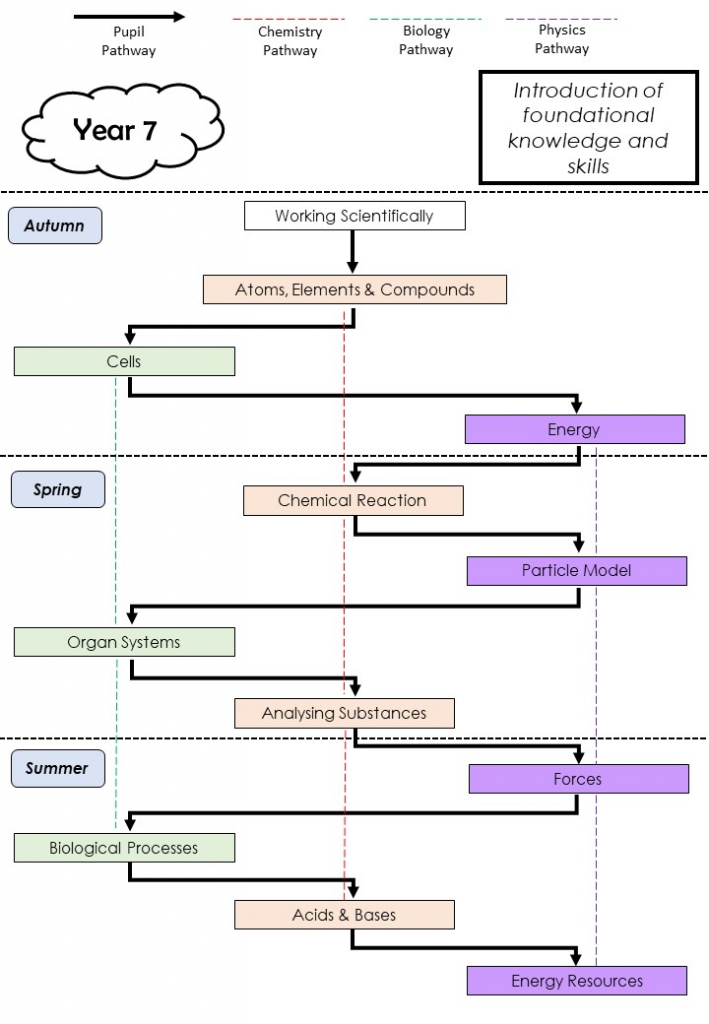
Year 8 Topics
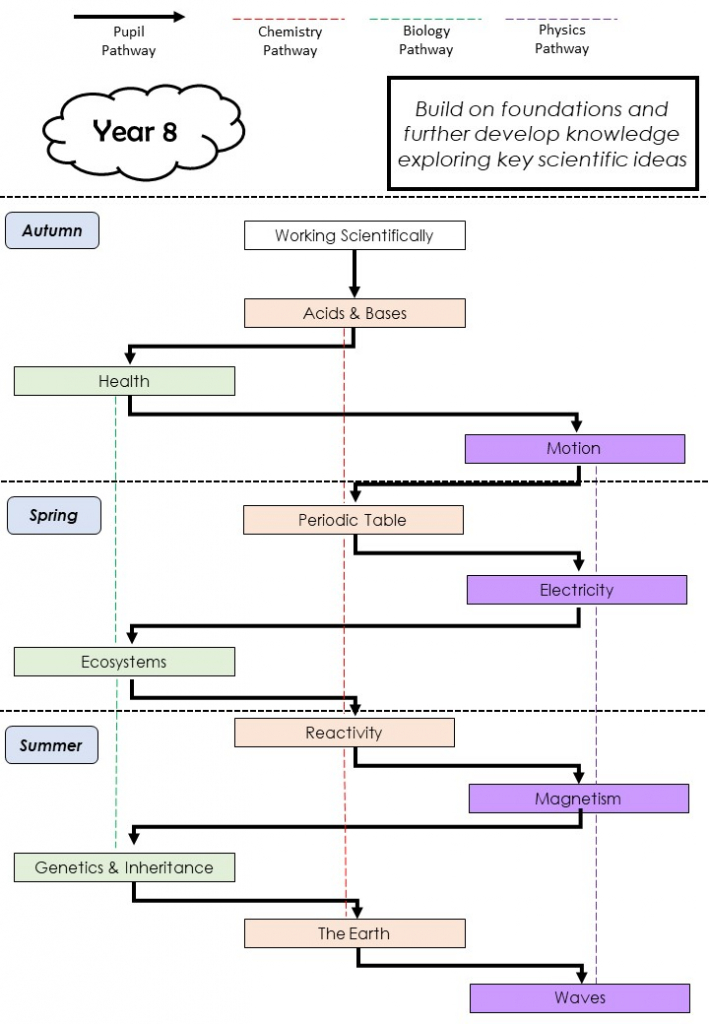
Year 9 Topics
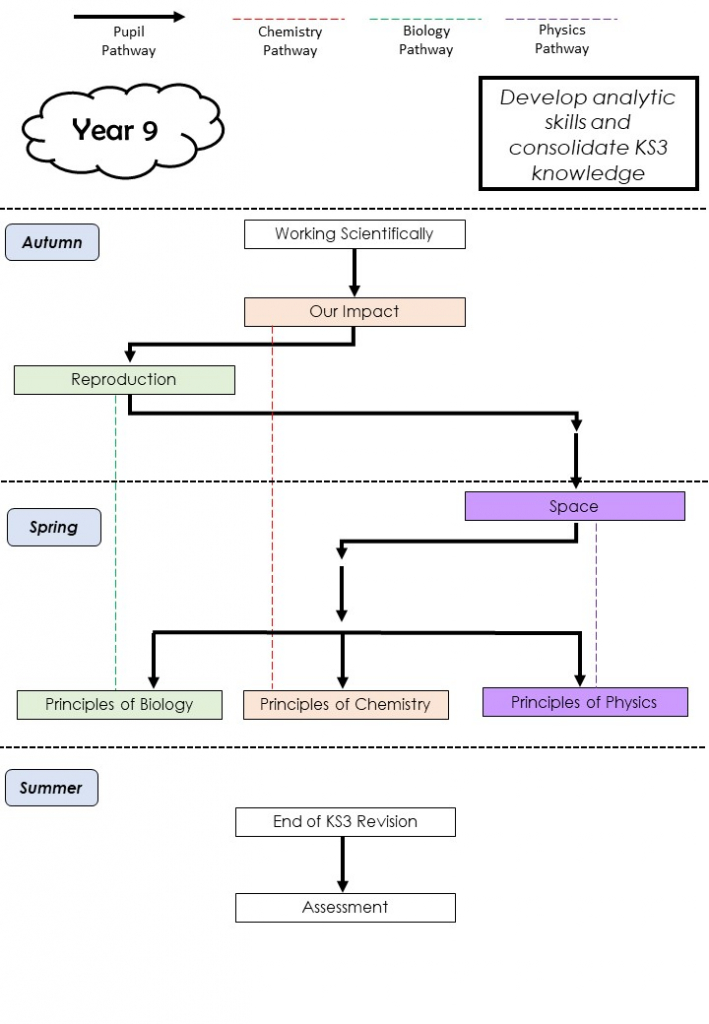
KEYSTAGE 4 Curriculum (Year 10 & Year 11)
AQA Biology, Chemistry and Physics: 3 Science GCSEs
Two Science classes will follow the AQA Biology, Chemistry and Physics specifications in Years 10 & 11, leading to 3 separate GCSEs. The qualification is linear and students will sit all their exams at the end of Year 11.
Students will sit 6 exams (2 Biology, 2 Chemistry and 2 Physics papers)
Each paper is:
- 1 hour 45 mins
- 100 marks
- 50% of GCSE
Questions on exam papers: multiple choice, structured, closed short answer and open response.
AQA Biology
Biology Paper 1: Biology Topics 1-4: Cell biology; Organisation; Infection and response; and Bioenergetics.
Biology Paper 2: Biology Topics 5-7: Homeostasis and response; Inheritance, variation and evolution; and Ecology.
Practical Assessment: Practical work is at the heart of Science. Students will complete 10 required practical activities throughout the Biology course. Students will be asked questions about the practical activities in their written exams.
AQA Biology Specification link –
https://filestore.aqa.org.uk/resources/biology/
AQA Chemistry
Chemistry Paper 1: Chemistry Topics 1-5: Atomic structure and the periodic table; Bonding, structure, and the properties of matter; Quantitative chemistry, Chemical changes; and Energy changes.
Chemistry Paper 2: Chemistry Topics 6-10: The rate and extent of chemical change; Organic chemistry; Chemical analysis, Chemistry of the atmosphere; and Using resources.
Practical Assessment: Practical work is at the heart of Science. Students will complete 8 required practical activities throughout the Chemistry course. Students will be asked questions about the practical activities in their written exams.
GCSE Chemistry Specification link
https://filestore.aqa.org.uk/resources/
AQA Physics
Physics Paper 1: Physics Topics 1-4: Energy; Electricity; particle model of matter; and Atomic Structure.
Physics Paper 2: Physics Topics 5-8: Forces; Waves; Magnetism and electromagnetism; and Space physics.
Practical Assessment: Practical work is at the heart of Science. Students will complete 10 required practical activities throughout the Physics course. Students will be asked questions about the practical activities in their written exams.
GCSE Physics Specification link
https://filestore.aqa.org.uk/resources/physics
KS4
AQA Combined Science: Trilogy Specification: 2 Science GCSEs
The majority of students follow the AQA Combined Science: Trilogy Specification in years 10 & 11. The qualification is linear and students will sit all their exams at the end of year 11.
Students will sit 6 exams (2 Biology, 2 Chemistry and 2 Physics papers)
Each paper is:
- 1 hour 15mins
- 70 marks
- 7% of GCSE
Questions on exam papers: multiple choice, structured, closed short answer and open response.
Practical Assessment: Practical work is at the heart of Science. Students will complete 21 required practical activities throughout the course. Students will be asked questions about the practical activities in their written exams. These questions will count for at least 15% of the overall marks for the qualification.
AQA Trilogy Science Specification
Gatsby Benchmarks
| Gatsby Benchmark | Actions/ Intentions |
| 1. A stable careers programme | Trips have taken place to; Big Bang, St Helens College Medical Day, MOND Trophy competition is entered every year to raise aspirations in STEM, visits to Catalyst Museum and Liverpool University.Schemes of work highlight career links and are highlighted within lessons.Careers board to showcase a range of science related careers for students to aspire to.Regularly reflect on curriculum and seek for further ways to incorporate trips linked to curriculum. For example, the introduction of Chester Zoo trip to accompany KS3 curriculum. |
| 2. Learning from career and labour market information. | Trip to the ‘Big Bang’ event for Year 8 students which links into LMI within STEM subjects.Trip to St Helens College Medical Day provided information on careers in the medical sector.Signposted on website and careers board to information on careers and further study in science. |
| 3. Addressing the needs of each pupil. | Career links and job opportunities referred to in lessons, schemes of work highlight career links for each topic studied at both KS3 and KS4.Our intention to build up a subject career’s library to allow student access to information on science related courses in College/ University. |
| 4. Linking curriculum to careers. | Links to careers and the bigger picture in our schemes of work and lessons.Medical Mavericks Day & What’s your Emergency Day – links to the medical industry and an insight into the roles and responsibilities of various jobs and what they come across. Research future opportunities.Continue to seek for ways for guest speakers to come into school in addition to trips that have included Liverpool University (Farm Urban Project) and St Helens College Medical Day.Working with a collection of schools under Ogden trust to promote Physics and encourage more students to further study Physics at A level. |
| 5. Encounters with Employers & Employees. | Science has welcomed Medical Mavericks Day & What’s your Emergency Day – links to the medical industry and an insight into the roles and responsibilities of various jobs.St Helens Medical Day for Year 10 separate science students interested in a career in medicine.Continue with our yearly trip to Big Bang. |
| 6. Experience of workplaces. | Opportunity for students to complete work experience placements in science prep room.Visits have included Daresbury Laboratories and Liverpool University (Farm Urban). Continue to seek further opportunities for students to visit workplaces or to see science in action. |
| 7. Encounters with further and higher education. | Trips to Universities and Colleges, including Liverpool University (Farm Urban Project), Big Bang (stalls from a range of employers and colleges) and St Helens College Medical Day for Year 10 students interested in a career in medicine.Farm Urban project took place at Liverpool University and a team of Year 10 students participated in this project.Our intention is to maintain and develop links to seek further opportunities to visit local colleges and Universities. |
| 8. Personal Guidance | Options evening – information is provided on career routes and pathways, for example highlighting that the separate science course equips students with an advantageous qualification to then go on to study medicine.Science career board that highlights careers in science.Careers in science shared on website and via Instagram. |
KS3 Chester Zoo
At KS3 to support the study of the topic Ecosystems, an annual trip to Chester Zoo is now incorporated into our Schemes of Work.

KS4 Opportunities for fieldwork
Opportunity for students to develop practical fieldwork skills.
Career connection links
- Biochemistry
- Conservation
- Engineering
- Environmental science and protection
- Forensic scientist
- Medical sector (Surgeons, doctors, nurses, pharmacists etc)
- Perfumer
- Physicist (Astrophysics and Nuclear Physicist)
- Research sector (including laboratory and fieldwork)
- Teaching
- Laboratory Technician
Further & Higher Education & Apprenticeship courses in science
Here are just a few;
Science related Degree courses
- Nutrition Science. Nutritional Science is a continuously evolving field.
- Pharmaceutical Science.
- Earth Sciences (Geology)
- Social Psychology
- Food Science
- Environmental Science
- Microbiology
- Genetics
- Nuclear Physics
Science related Apprenticeship courses
- Agriculture, Horticulture and Animal Care
- Construction, Planning and the Built Environment
- Education and Training
- Engineering and Manufacturing Technologies
- Health, Public Services and Care
- Leisure, Travel and Tourism
- Science and Mathematics
There are many more for you to view online, visit University websites and college websites to find out the whole range of exciting science related courses available.
Extra-curricular activities
We encourage students’ curiosity and enjoyment of Science through attending a wide variety of educational visits. The department also offers Key Stage 3 and Key Stage 4 Science clubs, which meet weekly after school for students who are interested in expanding their knowledge outside the classroom. This year we will be participating in the annual OAT competition known as STEM FEST.
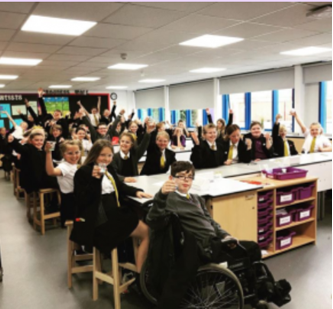
Intervention for Year 11 includes Saturday Academy workshops and scheduled after school intervention sessions as part of a whole school intervention programme. In addition, we deliver science masterclasses throughout the year to support our GCSE students to secure the higher grades in science. At KS3 we offer science surgery to offer tailored curriculum support.
KS3
KS3 Bitesize science
https://www.bbc.co.uk/bitesize/subjects/zng4d2p
KS4
Seneca learning – students can sign up for free and have access to video clips and quizzes
https://www.senecalearning.com/en-GB/
Cognito Channel on You tube – short videos on GCSE topics
Visit YouTube website and search for Cognito Science GCSE
Free science lessons – short tutorials on GCSE topics
Sparx Science
Please click the link: https://sparxscience.com/
Sparx science has a bank of over 23,000 questions designed to test knowledge and promote scientific thinking across our curriculum.
Homework is set weekly on sparx science. Overtime it will create personalised learning to address the gaps in your knowledge.
Students can also independently revise by answering questions. Help is provided for every question to help unblock students when they get stuck.
This is a really effective way to retain knowledge.
GCSE Revision Guides and Workbooks
Year 10 and Year 11 students can purchase from school GCSE CGP Revision Guide and the corresponding workbook. At the start of the GCSE course in Year 10 students will be provided with a letter outlining details regarding the purchasing of revision guides and workbooks. For further information please speak with your child’s science teacher.
Revision guide for students following GCSE Combined Science Trilogy Science.
CGP Revision guides for AQA Separate science course
CGP Workbooks to accompany revision guide for AQA GCSE Combined Science Trilogy course.
CGP workbooks to accompany revision guide for AQA Separate Science Courses
Cultural capital is of upmost important to us as a department. Our aim is to equip our students with knowledge and skills to respect the environment around us and to respect the beliefs of others. Providing students with opportunities, for example visits to Colleges and Universities. Exposing students to a range of equipment that allows students to investigate and challenge their scientific enquiry skills. Ensuring our students are exposed to opportunities available for further education. With the aim for students to be enriched with science capital so they are more likely to aspire to a science related career.
Trips and Visits
Medical Mavericks
A student practises taking blood samples from a (fake!) arm.
Year 9 become ‘Medical Mavericks’ for the day and explore careers in health care.
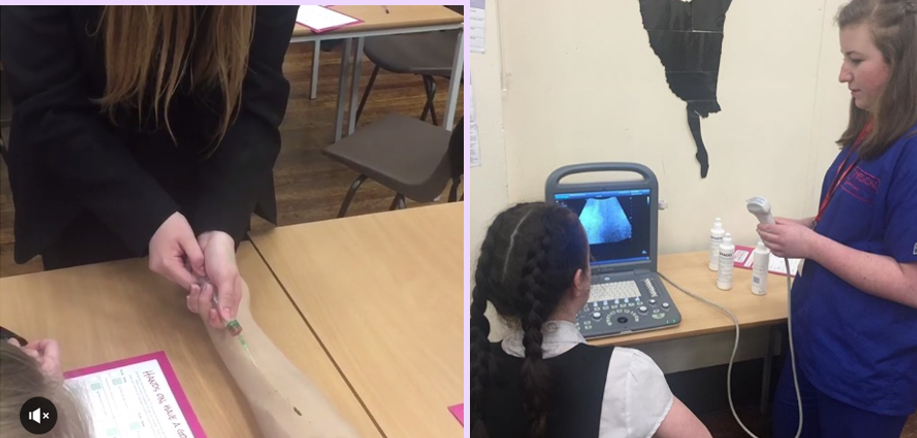
The Big Bang Fair
Year 7 & 8 students have attended the Big Band Fair held at Liverpool Echo Arena. Providing students with the opportunity to meet with local employers and companies in the STEM field.

Engineering Your Future Event
A group of Year 10 students who were interested in engineering as a career were taken to the Engineering Your Future Event. Companies such as Royals Royce, United Utilities and other medical and robotic engineers delivered workshops to the pupils and challenged them to think like engineers. The group impressed all the different companies with their curiosity and hard work and won the competition for being the best group of the day!
